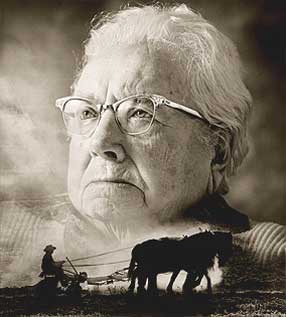Who We Are

Who They Are

Who You Are

Get Connected


Minnie Davidson
b. December 18, 1892
Bogator, Illinois. USA
 Memory is made up of fragments of images, impressions, and recollections of events. As I started to write about Minnie Davidson, I couldn't get the image of the shoebox full of deckled-edged snapshots and scraps of old letters out of my mind.
Memory is made up of fragments of images, impressions, and recollections of events. As I started to write about Minnie Davidson, I couldn't get the image of the shoebox full of deckled-edged snapshots and scraps of old letters out of my mind.
"Here, I've brought some of my mother's things for you to see" Minnie's son Gordon said.
"So who's this?" I asked. It was a worn picture, like a daguerreotype from Mathew Brady's era, of a group standing in front of a stark, unadorned farmhouse. "That's the family, that's the farm," the son said.
He handed me the shoebox of memorabilia and was very happy to sit next to me, going through item by item that illustrated parts of his mother's life. He seemed so devoted to her and I, new to interviewing at the time, felt some discomfort rummaging through a total stranger's life in a box. Minnie sat there in silence, looking straight ahead. She seemed to be struggling with something.
Minnie was born the seventh of eleven children in Bogator, Illinois. She went to a country school up to the eighth grade. She married in her early twenties and moved to a small farm in Jasper County, Iowa. Her remembrance of the trip was that they took three or four horses and a milk cow on a train to Laverne, Iowa, to their new farm. Long winters and a simple existence best describes her life. Life outside the farm was spent at the Methodist church a mile up the road. She had three children and lived on the farm until the age of ninety when she moved into the Good Samaritan Care facility. The absence of what we today would call creature comforts could define her life in the Midwest. She seemed to have lived by stresses of nature and the rhythms of farm life.
Minnie didn't seem well. She wasn't conversant. She sat stoically to be photographed. There were parts of her life that her son couldn't recall or never really knew, but unfortunately, she didn't provide some of the answers that would have helped me to fill in the different periods of her life. She seemed distant, not quite engaged with the photo session. It was news, however, for the town. The town's newspaper reporter and photographer came to cover the event of Minnie being interviewed for a book.
As I was driving across the prairie, I received a call on my cell phone from the director of Minnie's care facility. "Minnie passed away after you left. I thought you might want to know," he said.
It was my first loss on the project. Clearly it would not be the last, but I was unprepared and it saddened me. Unlike a doctor or someone on the frontlines of care, I was unaccustomed to death. It was a vague idea that you hear about or read about, but there was an unreality to it. I wondered if Minnie knew how near she was to the end, and whether she had perhaps held out for me to get there.
Click here to view the next supercentenarian's story.© 2009 Earth's Elders
